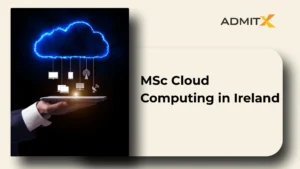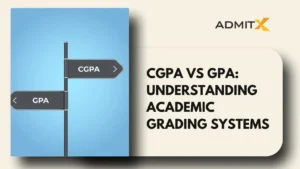- Most MSc Cloud Computing programmes in Ireland span only 1 year and combine theory, practical skills, and industry exposure, saving time and cost.
- Ireland’s Third Level Graduate Scheme offers up to a 24-month post-study work visa for international graduates with Level 9 qualifications.
- Average salaries for cloud computing professionals in Ireland range from €46,500 to €200,000 (₹47.7 L–₹2 Cr) annually
- Best Universities for MSc Cloud Computing in Ireland
- Academic Curriculum for MSc Cloud Computing in Ireland
- Eligibility Criteria for MSc Cloud Computing in Ireland
- Top Job Roles & Salaries After MSc in Cloud Computing in Ireland
- Cost of Living in Ireland for Indian Students
- Post-Study Work Opportunities for International Graduates in Ireland
- Key Takeaways
- FAQs

What if your next degree could place you at the heart of the infrastructure powering Netflix, Spotify, and millions of daily transactions worldwide? Ireland hosts data centre operations for AWS, Microsoft Azure, and Google Cloud, creating a unique ecosystem where cloud specialists are in constant demand. AWS has contributed nearly €11.4 billion to Ireland’s economic output, making cloud computing a cornerstone of the country’s tech economy.
Ireland’s tech ecosystem is booming, with more than 2,200 startups providing employment to nearly 55,000 professionals. Most programmes in Ireland’s top universities open direct pathways to careers in hyperscale data centres and cloud consulting.
In this blog, we will explore everything you need to know about pursuing an MSc in Cloud Computing in Ireland.
Best Universities for MSc Cloud Computing in Ireland
MSc in Cloud Computing in Ireland typically spans one year (90 ECTS), offering a strong academic framework, research opportunities, and industry-aligned training. These programmes focus on cloud architecture, security, DevOps practices, and emerging technologies like serverless computing and multi-cloud strategies.
| University | Programme | Total Tuition Fee (EUR/INR) |
|---|---|---|
| University College Dublin | MSc Computer Science (Negotiated Learning) - Cloud Computing Track | €27,720 (₹28.4L) |
| Technological University of Shannon | Master of Science in Software Design with Cloud Native Computing | €17,500 (₹17.9L) |
| National College of Ireland | MSc Cloud Computing | €17,000 (₹17.4L) |
| Atlantic Technological University | MSc Computing in Cloud Technologies | €14,000 (₹14.2L) |
| Munster Technological University | MSc Cloud Computing | €13,500 (₹13.8L) |
| University of Galway | PDip (Software Development, Cloud Computing and DevOps) | Funding through Springboard+, employed candidates pay: €815 (₹83,583) |
Academic Curriculum for MSc Cloud Computing in Ireland
Irish cloud computing programmes merge technical depth with business application in 12 months full-time. The curriculum balances core cloud technologies with specialised skills in security, automation, and enterprise architecture.
Core Foundation Modules
Cloud Architecture: Virtualisation, containerisation (Docker, Kubernetes), microservices, cloud-native design patterns
Programming: Python, Java, Go, Bash scripting, infrastructure as code (Terraform, Ansible)
Cloud Platforms: AWS, Microsoft Azure, Google Cloud Platform, service models (IaaS, PaaS, SaaS)
Specialisation Areas
Cloud Security: Identity and access management, encryption, compliance frameworks (GDPR, ISO 27001), threat detection
DevOps & Automation: CI/CD pipelines, Jenkins, GitLab, monitoring tools (Prometheus, Grafana), agile methodologies
Data Management: Cloud databases (NoSQL, SQL), data lakes, stream processing, backup and disaster recovery
Enterprise Solutions: Cloud migration strategies, cost optimisation, multi-cloud management, serverless computing
Capstone Experience
30-credit dissertation/project with industry partners and research centres, providing hands-on experience in real-world cloud deployments and potential employment pathways.
Eligibility Criteria for MSc Cloud Computing in Ireland
Understanding the academic and language requirements helps you prepare a competitive application for Irish cloud computing programmes. Irish universities look for candidates with strong technical foundations and proven English proficiency.
- A Level 8 honours bachelor’s degree (2:1 or 2:2) with 60-65% or 6-6.5 CGPA in a cognate area (e.g., computer science, software engineering, information technology, electronics)
*Verify eligibility for your favourite university using our CGPA Calculator
- A strong background in programming (Python, Java, C#), networking fundamentals, operating systems, and database management is important.
- Applicants must show English proficiency through one of the following: IELTS 6.5 (no band below 6.0), TOEFL iBT 90+, PTE 63+, or Duolingo 110+.
- Join our FREE IELTS Bootcamp course for targeted practice across Listening, Reading, Writing, and Speaking, with live feedback from certified trainers. Enroll today!
Top Job Roles & Salaries After MSc in Cloud Computing in Ireland
Cloud computing specialists and software developers are in high demand in Ireland and are listed on the country’s Critical Skills Occupations List. Below are some of the top job roles and career opportunities after MSc Cloud Computing:
| Job Role | Annual Salary Range | Top Employers |
|---|---|---|
| Cloud Engineer | €46,500 - €71,000 (₹47.7 L - ₹72.8 L) | AWS, Microsoft, Google Cloud, Accenture, IBM |
| DevOps Engineer | €48,263 - €77,000 (₹49.4 L - ₹79.0 L) | Meta Ireland, Salesforce, VMware, AWS, Oracle |
| Cloud Solutions Architect | €70,796 - €96,440 (₹72.6 L - ₹98.8 L) | Microsoft Ireland, AWS, Google Cloud, Accenture |
| Site Reliability Engineer (SRE) | €60,466 - €109,487 (₹62.0 L - ₹112.3 L) | LinkedIn, Apple, Google, Dell Technologies |
| Cloud Security Engineer | €68,050 - €200,000 (₹69.7 L - ₹205.1 L) | CyberArk, Palo Alto Networks, Symantec, AWS |
Cost of Living in Ireland for Indian Students
Living costs in Ireland vary between major cities and smaller university towns, with Dublin being the most expensive but offering the most career opportunities.
International students can also work up to 20 hours weekly during term time and 40 hours per week during official holiday periods to support their expenses.
| Category | Dublin | Cork/Galway | Other Cities |
|---|---|---|---|
| Accommodation | €500-700 (₹51,282-71,795) | €350-500 (₹35,996-56,565) | €300-450 (₹30,769-46,281) |
| Food | €200-300 (₹20,512-₹30,769) | €150-250 (₹15,384-25,641) | €120-200 (₹12,341-20,512) |
| Transport | €50-80 (₹5,128-8,205) | €30-50 (₹3,076-5,128) | €20-40 (₹2,051-4,102) |
| Textbooks & Materials | €30-50 (₹3,076-5,128) | €25-40 (₹2,571-4,102) | €20-35 (₹2,051-3,700) |
| Other (utilities, mobile, personal) | €150-250 (₹15,384-25,641) | €120-200 (₹12,307-20,512) | €100-150 (₹10,256-15,384) |
| Total Monthly Expenses | €930-1,380 (₹95,385-1.4 Lakh) | €675-1,040 (₹69,231-1 Lakh) | €560-875 (₹57,436-89,744) |
Post-Study Work Opportunities for International Graduates in Ireland
Ireland offers the Third Level Graduate Scheme, allowing non-EU/EEA graduates to gain Irish work experience for 2 years, and potentially secure long-term employment.
Third Level Graduate Scheme (Post-Study Work Visa):
The scheme allows non-EU master’s graduates (including masters in AI) with NFQ Level 9+ to stay in Ireland for up to 24 months to seek employment or apply for a work permit.
Critical Skills Employment Permit:
This permit is for highly skilled professionals, and has an initial duration of 24 months (can be extended after 21 months). It offers a pathway to long-term residency and allows holders to bring their family to Ireland.
General Employment Permit:
This is an option for those who have a qualifying job offer but don’t meet the criteria for the Critical Skills permit. This permit has an initial duration of 2 years and can be renewed for up to 3 additional years.
Key Takeaways
An MSc in Cloud Computing in Ireland prepares students for one of Europe’s most dynamic tech sectors. With programmes spanning just 12 months and affordable tuition, this qualification offers exceptional value and accelerated career entry. Graduates gain practical exposure and technical depth that directly align with industry needs. Programmes combine hands-on projects, cloud architecture, security, and DevOps skills, preparing students for high-demand roles recognised on Ireland’s Critical Skills Occupations List.
Our expert counsellors at AdmitX, have successfully guided thousands of Indian students to top Irish universities with end-to-end support including:
- University Selection Guidance
- SOP Review
- Study-Abroad Document Templates
- Free IELTS Bootcamp Course
- Scholarship Assistance
- Visa Support Services
Book your FREE study-abroad counselling session today!
FAQs
How long does an MSc in Cloud Computing take to complete in Ireland?
Most MSc Cloud Computing programmes in Ireland span one year full-time (90 ECTS credits) with hands-on industry projects.
What English language scores are required for Cloud Computing courses in Ireland?
Students need IELTS 6.5 (no band below 6.0), TOEFL iBT 90+, PTE 63+, or Duolingo 110+ to meet English proficiency requirements.
How long can I stay in Ireland after completing my Masters of Science in Cloud Computing?
Graduates receive a 24-month post-study work visa through Ireland’s Third Level Graduate Scheme to secure employment or apply for work permits.
How long does Irish student visa processing take?
Visa processing typically takes 4-8 weeks (up to two months), so students should apply at least three months before their intended travel date.
What is a PPS number and why do international students need one in Ireland?
A Personal Public Service (PPS) number is your unique identifier for working, banking, accessing healthcare, and graduating from Irish universities.
Can international students get discounted public transport in Ireland?
Full-time students qualify for the Student Leap Card offering 50% discount on buses, trains, and trams across Ireland’s Transport for Ireland network.
How many hours can international students work during term time in Ireland?
Non-EU students on Stamp 2 visas can work 20 hours weekly during term and 40 hours weekly during holiday periods.
Can international students claim tax relief on tuition fees in Ireland?
Yes, students paying income tax in Ireland can claim 20% tax relief on qualifying tuition fees up to €7,000 annually through Revenue’s my account service.
What are the main university intake periods for master's programmes in Ireland?
Irish universities offer two primary intakes: September (main intake with maximum course options) and January (smaller intake for select postgraduate programmes).
How much funds must I show for an Irish student visa?
For an Irish student visa, students must show proof of€10,000 for living expenses, plus a separate payment of at least €6,000 towards your tuition fees.
If you are an aspirant looking to study at your dream university, book an appointment with AdmitX today and start your applications early to avail yourself of all the benefits.














